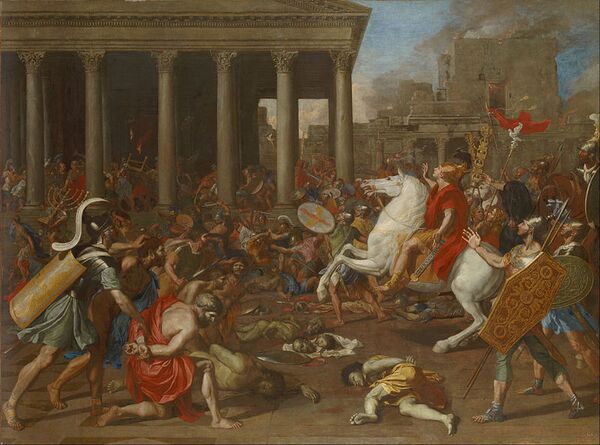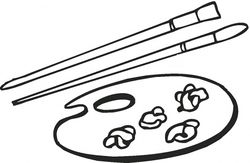Category:Titus (subject)
|
Titus (Home Page)
< Events : Jewish War -- Titus & Berenice > < People : Vespasian -- Berenice -- Josephus -- Herod Agrippa II -- Domitian > < Artifacts : Arch of Titus -- Judea Capta Coin >
Titus -- Overview Titus, son of Vespasian, followed his father in Judaea in 67 CE. Titus’s siege and conquest of Jerusalem resulted in the destruction of the city and the razing of the Temple. Titus succeeded to his father as emperor from 79 till 81 CE as the second ruler of the Flavian dynasty. Early Career Titus was born in Rome in 39 CE. He was the elder son of Vespasian and Domitilla. He was soon introduced to Claudius’s imperial court, where he was educated together with Britannicus, the emperor’s son. His cursus honorum prior to his appointment to his father’s staff in Judaea included the position of military tribune in 61 CE in Britannia and in 63 CE in Germania. In 64 CE Titus married Arrecina Tertulla, daughter of a former prefect of the praetorians, who died in 65 CE. Titus was married once more to Marcia Furnilla. Their only offspring was a daughter, Iulia Titi. In 67, Titus followed his father in the East, as legatus of the Legio XV Apollinaris. Titus took part in the military operations in Galilee, at the orders of his father in 67 CE. There he had the occasion to meet Berenice, the sister of the allied Herodian client – King Agrippa I, who allegedly became his lover. When Vespasian left for Rome, Titus was appointed commander in chief in Judaea in 69 CE. His main task was to besiege Jerusalem. His staff was under the command of Tiberius Iulius Alexander, and it included Flavius Josephus. Titus conquered Jerusalem in the summer of 70 CE. The city was destroyed and the Temple burned down. Titus celebrated his victory with games held at Caesarea Maritima and Berytus, where Jewish prisoners were slaughtered in gladiatorial games. He then travelled to Zeugma on the Euphrates, where he met Vologases I of Parthia. In 71 CE, he was back in Rome, where he was awarded a triumph together with his father. During his father’s rule, Vespasian he occupied the position of pretorian prefect, although he hold Senatorial rank. Titus held seven consulships during Vespasian's reign. It is in this period that Titus was joined at Rome by his former lover Berenice and her brother Agrippa II. It seems that Titus resumed his former relationship with Berenice. Imperial Succession Titus succeeded to his father in 79 CE. His short rule is mostly known for the eruption of the Vesuvius in 79 C.E., when the cities of Pompeii, Herculanum, and Stabiae were utterly destroyed. The following year, in 80 CE, a fire devastated Rome. Titus had Tiberius Iulius Alexander, his former chief of staff during the siege of Jerusalem, appointed as the praetorian prefect. However Titus, once emperor, had to send back Berenice. The liaison was seen in a negative light by the population of Rome, which compared the beautiful Jewish queen to a new Cleopatra. Titus stopped the treason trials, punishing the delatores. No senator was ever sentenced to death during his rule. At Rome, Titus erected on the former site of Nero's Domus Aurea, his own huge baths, the Thermae of Titus, and continued the building of the Colosseum, which was inaugurated with a long series of games in 80 CE. Titus died in 81 CE, and was succeeded by his brother Domitian. The Senate deified him after his death.
Titus, the Jews and Judaea Titus ended the Jewish War with the conquest of Jerusalem, and the destruction of the Temple. Therefore for the Jews, Titus is seen as the responsible for the destruction of Jerusalem and of the Temple. In Rabbinic literature, a legend report that Titus died killed by a fly which had entered his brains as consequence for his wicked actions. However Titus was in fact the patron of Joseph ben Mattatihu, who was freed by Vespasian at Titus’s insistence, and followed his patrons in Rome, becoming a Roman citizen under the name of Titus Flavius Josephus. Josephus lived in the house occupied by the Flavians, prior to their ascension to the imperial throne. Josephus was not the only Jew to whom Titus showed his patronage and favor. Most notably, Agrippa II and his sister Berenice enjoyed the imperial favor. Probably for a while, first in Judaea, and then in Rome, Berenice became his lover; see Titus & Berenice. Titus as well promoted Tiberius Iulius Alexander to the position of praetorian prefect, the pinnacle of the equestrian career. Titus continued to mint Judaea Capta coins to celebrate the victory in the Jewish War and to levy the Fiscus Iudaicus. Related categories External links
|
The "rediscovery" of Josephus brought about a new interest in the figure of Titus and his role in the destruction of Jerusalem (see, notably, Poussin's paintings). With Madeleine de Scudéry's novel, Lettres de Bérénice à Titus (1642), the emphasis shifted from politics to romance. The love story of Titus and Berenice was at the center of a long series of works of fiction. In the 17th century we had a series of play, culminating in Racine's play in 1670. The 18th cent. was the golden age of operas on Titus. It was a sequel, however, that took central stage, La clemenza di Tito by Pietro Metastasio, set to music by more than 40 composers.
|
Pages in category "Titus (subject)"
The following 96 pages are in this category, out of 96 total.
1
- The Triumph of Titus and Vespasian (1540 Romano), art
- La gitana melancólica (1608 Aguilar), play
- The Jewes Tragedy (1626 Heminges), play
- Destruction of Jerusalem by Titus (1626 Poussin), art
- (++) Lettres de Bérénice à Titus (Letters of Berenice to Titus / 1642 Scudéry), novel
- Bérénice (1648 Segrais), novel
- Tite (1660 Magnon), play
- Il Tito (Titus / 1666 Cesti / Beregani), opera (music & libretto), Venice premiere
- Il Tito (1668 Binitti), opera
- Tite et Bérenice (1670 Corneille), play
- Tite et Titus; ou, Les deux Bérénices (1673 Anonymous), play
- Titus and Berenice (1676 Otway), play
- Tito e Berenice (Titus and Berenice / 1714 Caldara / Capece), opera (music & libretto), Rome premiere (cast)
- Berenice (1725 Orlandini / Pasqualigo), opera (music & libretto), Venice premiere (cast)
- Il Titto / Titus l'empereur (Titus / 1731 Haendel), opera (music)
- La clemenza di Tito (The Clemency of Titus / 1734 Caldara / @1734 Metastasio), opera (music), Vienna premiere
- La clemenza di Tito (The Clemency of Titus / 1734 Metastasio), libretto (opera)
- Tito Vespasiano; ovvero, La clemenza di Tito (The Clemency of Titus / 1735 Hasse / @1734 Metastasio), opera (music), Pesaro premiere (cast)
- La clemenza di Tito (The Clemency of Titus / 1735 Leo / @1734 Metastasio), opera (music), Venice premiere (cast)
- La clemenza di Tito (The Clemency of Titus / 1736 Ciocchetti / @1734 Metastasio), opera (music), Genoa premiere (cast)
- La clemenza di Tito (The Clemency of Titus / 1736 Peli / @1734 Metastasio), opera (music), Munich premiere
- La clemenza di Tito (The Clemency of Titus / 1737 Marchi / @1734 Metastasio), opera (music), Milan premiere (cast)
- La clemenza di Tito / The Clemency of Titus (1737 Veracini / Cori, @1734 Metastasio), opera (music), London premiere (cast)
- La clemenza di Tito (The Clemency of Titus / 1738 Arena / @1734 Metastasio), opera (music), Turin premiere (cast)
- La clemenza di Tito (The Clemency of Titus / 1746 Wagenseil / @1734 Metastasio), opera (music), Vienna premiere
- La clemenza di Tito (The Clemency of Titus / 1747 Corselli, Corradini, Meli / @1734 Metastasio), opera (music), Madrid premiere
- La clemenza di Tito (The Clemency of Titus / 1747 Manna / @1734 Metastasio), opera (music), Messina premiere
- La clemenza di Tito (The Clemency of Titus / 1748 Grua / @1734 Metastasio), opera (music), Mannheim premiere
- La clemenza di Tito (The Clemency of Titus / 1748 Pampani / @1734 Metastasio), opera (music), Venice premiere (cast)
- La clemenza di Tito (The Clemency of Titus / 1752 Gluck / @1734 Metastasio), opera (music), Naples premiere
- La clemenza di Tito (The Clemency of Titus / 1753 Adolfati / @1734 Metastasio), opera (music), Genoa premiere
- La clemenza di Tito (The Clemency of Titus / 1753 Jommelli / @1734 Metastasio), opera (music), Stuttgart premiere (cast)
- La clemenza di Tito (The Clemency of Titus / 1753 Valentini / Palomba, @1734 Metastasio), opera (music), Bologna premiere (cast)
- La clemenza di Tito (The Clemency of Titus / 1755 Mazzoni / @1734 Metastasio), opera (music), Lisbon premiere (cast)
- La clemenza di Tito (The Clemency of Titus / 1757 Ciampi / @1734 Metastasio), opera (music), Venice premiere (cast)
- La clemenza di Tito (The Clemency of Titus / 1757 Cristiani / @1734 Metastasio), opera (music), Camerino premiere (cast)
- La clemenza di Tito (The Clemency of Titus / 1757 Holzbauer / Verazi, @1734 Metastasio), opera (music), Mannheim premiere
- La clemenza di Tito (The Clemency of Titus / 1760 Cocchi / @1734 Metastasio), opera (music), Bologna premiere
- La clemenza di Tito (The Clemency of Titus / 1760 Galuppi / @1734 Metastasio), opera (music), Turin premiere (cast)
- La clemenza di Tito (The Clemency of Titus / 1760 Scarlatti / @1734 Metastasio), opera (music), Venice premiere (cast)
- Berenice (1764 Piccinni / @1725 Pasqualigo), opera (music), Naples premiere
- La clemenza di Tito (The Clemency of Titus / 1766 Platania / @1734 Metastasio), opera (music), Milan premiere
- La clemenza di Tito (The Clemency of Titus / 1768 Bernasconi / @1734 Metastasio), opera (music), Munich premiere
- La clemenza di Tito (The Clemency of Titus / 1769 Anfossi / @1734 Metastasio), opera (music), Rome premiere
- La clemenza di Tito (The Clemency of Titus / 1769 Naumann / @1734 Metastasio), opera (music), Dresden premiere
- Berenice (1770 Platania / Durandi), opera (music & libretto), Turin premiere (cast)
- La clemenza di Tito (The Clemency of Titus / 1771 Sarti / @1734 Metastasio), opera (music), Padua premiere
- La clemenza di Tito (The Clemency of Titus / 1773 Myslivecek / @1734 Metastasio), opera (music), Venice premiere
- Tito e Berenice (Titus & Berenice / 1776 Mei / Lanfranchi-Rossi), opera (music & libretto), Pisa premiere
- La clemenza di Tito (The Clemency of Titus / 1779 Beltrami / @1734 Metastasio), opera (music), Verona premiere
- Tito e Berenice (1782 Franchi), ballet
- Berenice (1786 Rust / @1770 Durandi), opera (music), Parma premiere
- La clemenza di Tito (The Clemency of Titus / 1787 Apell / @1734 Metastasio), opera (music), Kassel premiere
- La clemenza di Tito (The Clemency of Titus / 1798 Ottani / @1734 Metastasio), opera (music), Turin premiere (cast)
- Tito; o, La partenza di Berenice (1790 Angiolini), ballet
- (++) La clemenza di Tito (The Clemency of Titus / 1791 Mozart / Mazzolà, @1734 Metastasio), opera (music & libretto), Prague premiere (cast)
- Tito e Berenice (Titus and Berenice / 1793 Nasolini / Foppa), opera (music & libretto), Venice premiere (cast)
- La clemenza di Tito (The Clemency of Titus / 1797 Nicolini / @1734 Metastasio), opera (music), Livorno premiere
- La clemenza di Tito (The Clemency of Titus / 1802 Del Fante / @1734 Metastasio), opera (music), Florence premiere
- Berenice in Roma (Berenice in Rome / 1824 Raimondi / Bordese), opera (music & libretto), Naples premiere (cast)
- Titus; oder, Die Zerstörung Jerusalems (1855 Kossarski), play
- L'ultimo giorno di Gerusalemme (1858 Lucchesi), opera
- Titus et Bérénice (Titus and Berenice / 1860 Gastinel / Fournier), opera (music & libretto), Paris premiere
- Salome (1867 Heywood), play
- The Triumph of Titus (1885 Alma-Tadema), art
- Berenike (1890 Schumacher), novel
- Orjan oppi (A Slave's Doctrine / 1902 Järnefelt), play
- Die Kaiser Titus und Hadrian im Talmud und Midrasch sowie bei den zeitgenössischen Geschichtsschreibern (1906 Spiegel), book
- Bérénice (1909 Magnard / Magnard), opera (music & libretto)
- Titus und die Jüdin (1911 Kyser), play
- Lost Diaries: From the Diary of Emperor Titus (1913 Baring), novel
- Bérénice, l'Hérodienne (1919 Du Bois), play
- Berenice (1922 Masefield), play
- Titus and Berenice (1926 Boyle), play
- Bérénice, la reine de Cesarée (1940 Brasillach), play
- Berenika (1940 Wohlman), play
- Berenice, Princess of Judea (1959 Kolb), novel
- Titus (1962 Törnroos / @1902 Järnefelt), Finnish (TV) production (play)
- (+) Agrippa's Daughter (1964 Fast), novel
- La pourpre de Judée; ou, Les délices du genre humain (1967 Clavel), novel
- Bérénice (1968 Jolivet / @1670 Racine), French (TV) production (play)
- Tito y Berenice (1970 Marqués), play
- Tytus i Berenika (1972 Krawczuk), book
- Bérénice (1975 Rouleau / @1670 Racine), French (TV) production (play)
- Bérénice: ou, Le sortilège de Béryte (1976 Ambelain), novel
- Le mythe de Bérénice (The Myth of Berenice / 1978 Akerman), book
- La clemenza di Tito (The Clemency of Titus / 1980 Ponnelle, Levine / @1791 Mozart), filmed opera
- Bérénice (1983 Ruíz / @1670 Racine), video recording (play)
- La clemenza di Tito (The Clemency of Titus / 1987 Olofsson, Järvefelt, Östman / @1791 Mozart), filmed operas
- Bérénice, la reine humiliée (1988 Delouche), novel
- La clemenza di Tito (The Clemency of Titus / 1991 Lough, Hytner, Davis / @1791 Mozart), filmed opera
Media in category "Titus (subject)"
The following 3 files are in this category, out of 3 total.
- 1637 * Poussin (art).jpg 800 × 593; 110 KB
- 1670 * Racine (play).jpg 333 × 499; 27 KB
- 1846 * Kaulbach (art).jpg 723 × 600; 106 KB







